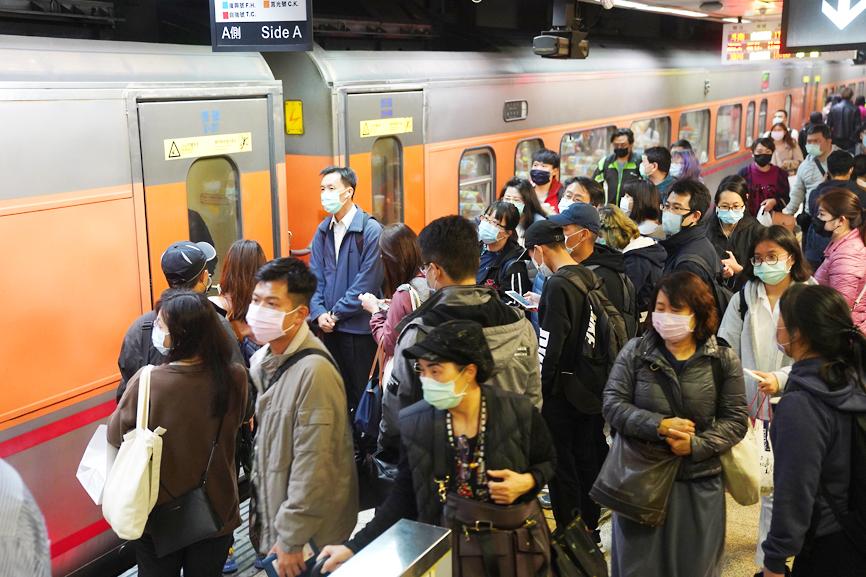The Ministry of Transportation and Communications (MOTC) yesterday faced criticism from members of the Legislative Yuan’s Transportation Committee for announcing on Tuesday that all train and freeway bus passengers would need to wear masks and have their temperatures taken before boarding as part of measures to prevent the spread of COVID-19.
While most commuters adapted to the new measures when they went into effect yesterday, many who were not aware of the changes argued with train and bus station staff, and complained that being forced to wear masks and wait in long lines to have their temperature taken caused them to miss their train or bus.
Chinese Nationalist Party (KMT) Legislator Hung Meng-kai (洪孟楷) said that while he does not disagree with the policy, the ministry should not announce new measures and institute them the next day, adding that such an abrupt move would definitely draw public ire.

Photo: CNA
As the Ministry of Economic Affairs has announced that adjustments to its mask sales policy would not be implemented until Thursday next week, when people can begin purchasing nine masks every two weeks instead of the current three per week, the MOTC’s new policy could cause commuters using public transport to not have enough masks, he said.
Some local government officials have signaled trouble enforcing the measure and have chosen to disregard it, leaving the nation with two policies regarding mask use, he added.
Independent Legislator Chao Cheng-yu (趙正宇) said that Minister of Transportation and Communications Lin Chia-lung (林佳龍) should not consider his notification of lawmakers an announcement of the policy, adding that the ministry should host a news conference to explain the new measures to the public.
Democratic Progressive Party Legislator Lin Chun-hsien (林俊憲) asked what the ministry would do if train or bus passengers defy the rules and insist on traveling, as well as what people should do if they are denied access to public transportation.
It should consider expanding disease-prevention taxi and rental car services so that people still have ways to commute, he said.
As many small train stations lack infrared imagers, trains could still be delayed in peak hours because station staff must take passengers’ temperatures one at a time, he added.
Deputy Minister of Transportation and Communications Huang Yu-ling (黃玉霖) said that the policy is compulsory and that those who do not comply would be prohibited from boarding trains and intercity buses.
The MOTC has planned for the policy’s enforcement and conducted drills since the Taiwan Lantern Festival in February, he said.
The policy applies only to Taiwan Railways Administration and Taiwan High Speed Rail Corp trains and freeway buses, Huang said, adding that whether MRT metropolitan rail networks enforce the measures depends on local governments.
Lin Chia-lung on Tuesday said that the policy would also apply to agencies supervised by the ministry, including 1,298 Chunghwa Post Co post offices and freeway rest areas.
The MOTC yesterday held a meeting to evaluate the implementation of the policy.
Apart from addressing the issues of passengers not wearing masks and long waits for temperature checks, it also required post offices, freeway rest areas and airports to enforce “social distancing” ordered by the Central Epidemic Command Center, by placing signs on floors indicating safe distances in areas where people have to line up for service.

An essay competition jointly organized by a local writing society and a publisher affiliated with the Chinese Communist Party (CCP) might have contravened the Act Governing Relations Between the People of the Taiwan Area and the Mainland Area (臺灣地區與大陸地區人民關係條例), the Mainland Affairs Council (MAC) said on Thursday. “In this case, the partner organization is clearly an agency under the CCP’s Fujian Provincial Committee,” MAC Deputy Minister and spokesperson Liang Wen-chieh (梁文傑) said at a news briefing in Taipei. “It also involves bringing Taiwanese students to China with all-expenses-paid arrangements to attend award ceremonies and camps,” Liang said. Those two “characteristics” are typically sufficient

A magnitude 5.9 earthquake that struck about 33km off the coast of Hualien City was the "main shock" in a series of quakes in the area, with aftershocks expected over the next three days, the Central Weather Administration (CWA) said yesterday. Prior to the magnitude 5.9 quake shaking most of Taiwan at 6:53pm yesterday, six other earthquakes stronger than a magnitude of 4, starting with a magnitude 5.5 quake at 6:09pm, occurred in the area. CWA Seismological Center Director Wu Chien-fu (吳健富) confirmed that the quakes were all part of the same series and that the magnitude 5.5 temblor was

The brilliant blue waters, thick foliage and bucolic atmosphere on this seemingly idyllic archipelago deep in the Pacific Ocean belie the key role it now plays in a titanic geopolitical struggle. Palau is again on the front line as China, and the US and its allies prepare their forces in an intensifying contest for control over the Asia-Pacific region. The democratic nation of just 17,000 people hosts US-controlled airstrips and soon-to-be-completed radar installations that the US military describes as “critical” to monitoring vast swathes of water and airspace. It is also a key piece of the second island chain, a string of

The Central Weather Administration has issued a heat alert for southeastern Taiwan, warning of temperatures as high as 36°C today, while alerting some coastal areas of strong winds later in the day. Kaohsiung’s Neimen District (內門) and Pingtung County’s Neipu Township (內埔) are under an orange heat alert, which warns of temperatures as high as 36°C for three consecutive days, the CWA said, citing southwest winds. The heat would also extend to Tainan’s Nansi (楠西) and Yujing (玉井) districts, as well as Pingtung’s Gaoshu (高樹), Yanpu (鹽埔) and Majia (瑪家) townships, it said, forecasting highs of up to 36°C in those areas